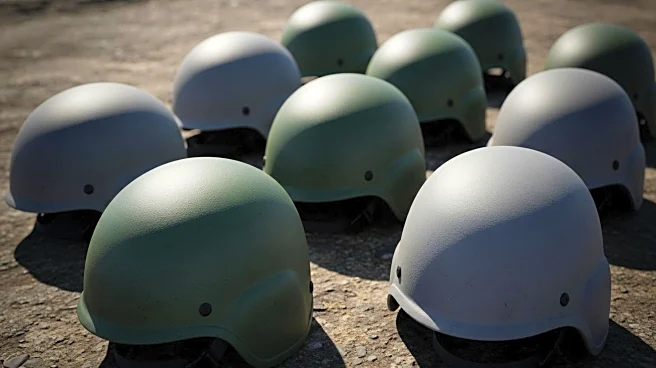What is the story about?
What's Happening?
Ukraine's military is contending with an extended front line that now stretches nearly 800 miles, according to General Oleksandr Syrskyi, Ukraine's top military commander. This expansion is a result of Russia's shift in tactics, which now involves deploying small assault groups to infiltrate Ukrainian lines. These groups, consisting of four to six soldiers, aim to penetrate the front line and disrupt Ukrainian supply lines and troop rotations. Despite these challenges, Ukrainian forces have managed to regain control of 65 square miles of territory. Additionally, Ukraine's long-range strike program has targeted Russian military and industrial assets, contributing to a fuel shortage in Russia. As winter approaches, Ukraine is enhancing its air-defense systems to counter expected escalations in Russian attacks on its power grid.
Why It's Important?
The developments on the Ukrainian front line have significant implications for the ongoing conflict and international relations. The shift in Russian tactics to smaller, more agile assault groups represents a strategic adaptation that could strain Ukrainian defenses. However, Ukraine's ability to reclaim territory and disrupt Russian logistics highlights its resilience and strategic capabilities. The conflict's dynamics are crucial for NATO and European security, as they influence military support and diplomatic strategies. The situation also affects global energy markets, given the potential for further disruptions in Russian fuel supplies. The outcome of these military engagements could shape future geopolitical alignments and the balance of power in Eastern Europe.
What's Next?
As the conflict continues, Ukraine is likely to focus on strengthening its defensive capabilities and maintaining its territorial gains. The international community, particularly NATO and the European Union, may need to reassess their support strategies to ensure Ukraine can withstand Russian advances. Diplomatic efforts to resolve the conflict could intensify, with potential implications for U.S.-European relations and global security policies. The approaching winter may also see increased humanitarian needs, prompting international aid efforts to support affected populations in Ukraine.
Beyond the Headlines
The ongoing conflict in Ukraine raises broader questions about the future of warfare and military strategy. The use of small, agile assault groups by Russia may signal a shift towards more decentralized and flexible military operations. This could influence military doctrines worldwide, prompting nations to adapt their training and equipment to counter similar tactics. Additionally, the conflict underscores the importance of technological advancements in warfare, as seen in Ukraine's use of drones and electronic warfare systems. These developments may drive further innovation in military technology and defense strategies globally.















